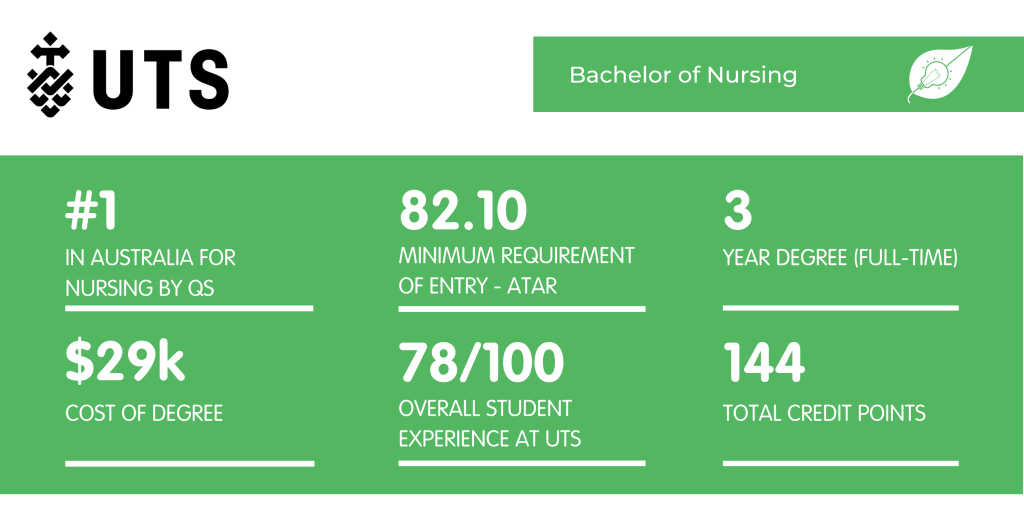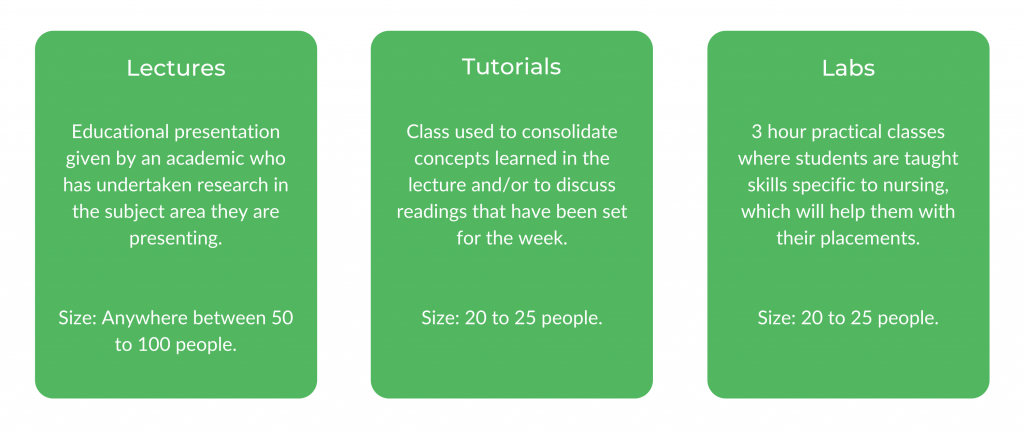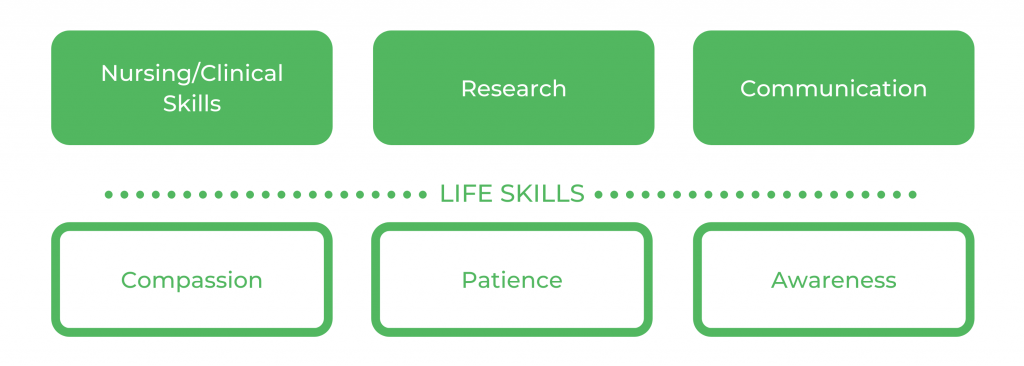 If you want to become a registered nurse, then a Bachelor of Nursing at UTS could be exactly right for you!
If you want to become a registered nurse, then a Bachelor of Nursing at UTS could be exactly right for you!
UTS offers the best nursing degree in Australia (yes, they’re ranked #1 within Australia) and that’s why we’ve collected all the info you need to know about the core units, assessments, clinical placements, uni culture and more!
Let’s jump into it!
What is a Bachelor of Nursing at UTS?
Core Units for this Degree
How to Get into a Bachelor of Nursing at UTS
What’s the Teaching Format?
What’s the Faculty and Culture Like?
What is a Bachelor of Nursing at UTS?
A Bachelor of Nursing at UTS provides you with the knowledge and professional skills you need to become a compassionate and competent registered nurse. The degree focuses on combining nursing theory with practical experience as well as a range of science and society/culture subjects.
By the end of the degree, you’ll have completed 800 placement hours in various professional health facilities – now, that’s not only impressive but it’s what gets you industry ready and makes this degree so hands on.
You’ll be taught by professionals who work as part-time nurses and are up to date with the latest knowledge and research. The laboratories that you learn in are state-of-the-art and have some very cool technology – we’re talking manikins that are mechanised to blink, breathe, talk and even have pulses so students can practice as if they were actual patients.
Can this degree be studied in conjunction with another?
You can take your degree to the next level by combining a Bachelor of Nursing with either a Bachelor of International Studies or a Bachelor of Creative Intelligence and Innovation. There’s the option to complete an Honours year for students who maintained at least a credit average and are interested in research.
Career Paths
A Bachelor of Nursing sets you up for a role as a registered nurse in a range of different areas. Depending on what you’re interested in, you could work in different units within hospitals such as:
-
- Intensive care
- Emergency room
- Surgeries,
- Aged care facilities
- Mental health facilities
You could also take on various research or health education roles – just think about all the new health information being discovered!
Core Units for this Degree

What are the Core Units?
Before we begin, a Bachelor of Nursing 2021 will see a change of structure. Most of the subjects are like the ones that are discussed here but the order is slightly different – you’ll still learn similar content though, so let’s dive in!
You cover a range of core units that all relate to nursing including medical, science and culture/society subjects. Although you have to do all of these subjects, they’re setting you up with the knowledge, practical skills and understanding you need to become a registered nurse.
First Year
In your first year, you’ll cover both Assessment and Therapeutics in Health Care 1 and 2; these subjects introduce you to the basic nursing concepts and practises. You’ll learn about hygiene and infection control as well as skills like how to administer medication and record vital signs – just to name a few, there’s loads more!
The subjects Health and Homeostasis 1 and 2 are more science-based and teach you all about the human body. In subjects like Communication and Diversity, there’s a focus on empathy and understanding different perspectives.
Second Year
In the second year, Evidence for Nursing focuses on research and analysing health information and guidelines. You’ll also cover Pathophysiology and Pharmacology 1 and 2 which are some big words but basically address disease, medicine and the body – it teaches you how to recognise symptoms, the different laboratory tests and treatment plans.
Contemporary Indigenous Health and Wellbeing looks at Indigenous history, health challenges Indigenous people face and develops cultural awareness. While all students have to do the subjects Fundamentals of Mental Health Nursing, Nursing Care of the Older Person, Medical Surgical Nursing and Family and Children’s Nursing, they can choose which two they do in Autumn and which two they do in Spring – giving you a bit of flexibility.
Third Year
Third year means you finally get to specialise (have a look below). You also cover subjects like Professional Accountability, Leadership for Beginning Practice and Navigating Transition which all address ethics, your professional identity and your responsibilities as a nurse.
You’ll extend your practical skills in Integrated Nursing Practice and also Complex Nursing Care: Medical Surgical. The subjects Optimising Care in Chronic Conditions and Complex Nursing Care: Mental Health are more specialised but very important and relevant areas of nursing.
Electives
In the third year, you get to specialise a little more by choosing one of the thirteen electives. There are some really interesting ones like Critical Care Nursing, Paediatric Nursing or even Women’s Health – just to name a few.
You can check out the rest of the electives you’ll get to choose from here!
What are the placements like?
Clinical placement hours are built in to the degree – actually, 800 hours! You have at least one placement every semester.
The placements are part of the practical subjects and get you out into the real world. They also correlate to the practical subject – so for the Nursing Care of the Older Person, you’ll use the skills you learnt in the clinical laboratory for that subject and take them to an aged care facility or maybe a dementia care facility.
You don’t have to find the placements because they are part of the degree, so UTS assigns you one based on the subject and where you live. That way, you won’t spend hours travelling to the other side of Sydney!
The placements are full on – we’re talking 5 days a week and you’ll either be put on a morning or afternoon shift. It’s pretty cool stuff because you would have already worked multiple times in different health facilities before you finish the degree!
What are the facilities like?
UTS has 16 clinical laboratories where students can practice their skills and learn in a similar environment to that of a hospital. The laboratories are decked out with medical equipment, hospital beds and even manikins for clinical simulation – you’re going to want to check out all the info here!
How to Get into a Bachelor of Nursing at UTS?
The ATAR cut off for a Bachelor of Nursing at UTS is 82.10 for full-time students. However, if you do well in some of the HSC subjects that are relevant to UTS Nursing, you may be up for some extra points!
You can have a look at the Year 12 Adjustment Factors for Nursing here!
Pathway Programs
You don’t have to worry if you didn’t make the ATAR cut off because UTS Insearch offers you another way to get there!
By successfully completing a UTS Foundations Studies in Health, you can then go into the first year of a Bachelor of Nursing. The Foundation Studies can be completed in either 8 (standard) or 12 (extended) months.
Are there any prerequisites?
You’ll need to have completed any two units of English – but hey, that’s okay because you don’t really have a choice in the HSC! If you took Mathematics or one of the Science subjects, let’s just say that you’ll be off to a head start.
What scholarships are available?
There are all sorts of scholarships that you can apply for at UTS which can be found here!
What’s the Teaching Format?
A Bachelor of Nursing at UTS combines lectures, tutorials and labs. You’ll complete the degree through semesters (thank goodness!)

Lectures
You usually have a one hour lecture a week for each subject and most of them are recorded (yay!).
Lectures are very content heavy and you’ll have to write a lot of notes to stay on top of everything. It depends on the subject but there will usually be between 20 to 30 people who rock up, give or take a few.
Tutorials
The tutorials are around two hours for each subject and are very discussion based. In the tutes, you interact with your peers, ask questions and complete group activities and you can expect to have around 20 students in your class.
Labs
Now, the labs are the exciting (and sometimes, challenging) part where you learn all your practical skills. You’ll have at least one practical subject a semester which usually correlates with your placement.
The labs go for three hours and the tutor walks you through everything. Again, it’s a more intimate sized class with around 20 students.
How many hours do you go to university?
If you study a Bachelor of Nursing at UTS full-time, you’ll take four subjects a semester. So, that means you’re looking at around 3 hours a subject which gives you 12 contact hours a week (depending on which subject, it can vary slightly).
But don’t forget, there’s also lots of content to revise in your own time and there’s a lot of online resources provided to help you do so! You’ll also have clinical placement hours on top of the normal semester.
What are the assessments like?
Theory Subjects
For the nursing theory and more science-based subjects, there is usually always a quiz which tests your knowledge on the content. Although they only weigh around 20%, if you’re prepared and stay on top of everything, they’re an easy way to get those marks!
You’ll also have to write reports for these kinds of subjects and use research to justify your responses. These can be in the form of group reports and sometimes, also individual reports.
The society/culture subjects such as Health and Society are more reflection and essay-based so there’s lots of analysing, research and writing! And of course, there is a big exam at the end of the semester.
Practical Subjects
Now to the assessments for the practical subjects! Once a year, you’ll have a practical assessment where you demonstrate your skills in front of a tutor (yes, it’s a little daunting).
You’re assessed on how well you treat the patient (in this case, the manikin), how you calculate and give out medicine, dress wounds and so on. Along with this, there’s also quizzes and academic writing such as essays or reports.
Skills that You Learn and Refine

From day one, this degree is hands on and you’ll even have a clinical placement in the first semester. So, you get to develop your nursing/clinical skills in the lab, learn how to handle different clinical scenarios and use these skills out into the real world.
As a nurse, you’ve got to be up to date with the latest health information and so there is a big emphasis on developing your research skills during the degree. You’ll learn how to find articles and key terms, engage and analyse with research and use that research to write literature reviews and reports.
You’re also going to refine your communication skills (written and oral). You have to write reports and essays as well as give presentations – being able to communicate clearly is a must for any nurse!
There’s also some great life skills that refine throughout this degree. You develop an awareness of the world you live in as you’re exposed to different kinds of people who you see at their worst and their best.
If you’re interested in this degree, you’re probably already a compassionate and kind person because you want to help people. Patience is another skill that you’ll develop, especially in challenging situations.
What’s the Faculty and Culture Like?
Nursing attracts people who all share similar ideas about caring for others and wanting to help, so it comes as no surprise that the culture within the Nursing Faculty at UTS is really supportive and warm. The students help each other study for exams and prepare for those daunting practical assessments.
As the degree can be quite intense and confronting at times, the students try to remain light hearted as a coping mechanism. Basically, what we’re trying to say is that we’re pretty sure you’ll make some lifelong friends from this degree.
There’s also the Nursing and Midwifery Society (NaMSoc) that runs a ton of events throughout the year where you’ll connect with new people and hear from successful UTS Graduates. There’s Welcome Drinks, the annual NaMSoc Ball where you’ll boogie the night away and listen to various speaker series addressing different health related topics.
Tanna Nankivell is a Content Writer at Art of Smart Education and is currently in Germany completing a year of study for her double degree in Communications (Journalism) and Bachelor of Arts (International Studies). She has had articles published on Central News – the UTS Journalism Lab and wrote a feature piece for Time Out Sydney during her internship. Tanna has a love for travel and the great outdoors, you’ll either find her on the snowfields or in the ocean, teaching aqua aerobics or creating short films.


